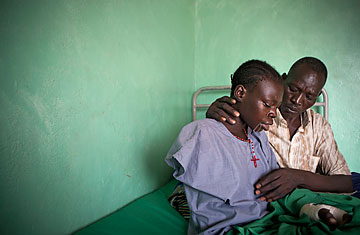
(2 of 3)
With the SPLA fighters advancing once more on Kadugli and thousands of Nuba civilians fleeing the town — and a total of 73,000 on the move across South Kordofan, according to the U.N. — what the north began as a targeted elimination of political and military opponents soon deteriorated into an onslaught against all Nuba and other black Africans. Antonovs, MiG-27s and helicopter gunships were dispatched to bomb SPLA forces, refugees and mountain villages. Juma Fadul, a 25-year-old taxi driver, was in church in the village of al-Hamra on July 2 when a gunship made a sustained half-hour assault with missiles and machine guns. Five villagers died; Fadul took a piece of shrapnel to his forehead as he tried to run away. He and Khalid Somi, sprayed with shrapnel up the right side of his body during a helicopter attack near Kadugli the same day, estimate 100 civilians died. "I saw the bodies scattered on the ground," says Somi. Juma Abdulaziz, 31, wounded in an Antonov strike outside Kadugli on June 15, says 50 friends and neighbors were executed in the town. "When I was brought here, I left my wife and two children there," Fadul says. "For sure, they are all dead."
Of the 161 patients Catena received from June 5 to July 3, about half were civilians, half SPLA soldiers. The surgeon has no doubts about the north's intent. "The idea is to scare the crap out of people, to terrorize them and force them out of their homes and their land."
A History of Failure
Sudan is where Arabia meets Africa, a geography enshrined in the place's name: Bilad al-Sudan is Arabic for "land of the blacks." An explanation for Khartoum's repression of the country's regions can be found in the centuries-old aspiration of Arabs to bring Islamic advancement to heathen Africans — which, as with Christian colonialists from Europe in other parts of Africa, followed earlier centuries of slave raiding. Khartoum's tyranny went hand in hand with economic marginalization.
The capital's dominance backfired. The south rebelled even before independence in 1956. In the 1980s and '90s, it was joined by fighters from the Nuba Mountains, Darfur and Blue Nile. Ethnic Beja fighters in the east also took up arms. Even the far north has a self-determination movement. And despite superior armor, Khartoum was unable to beat its opponents militarily. The conflict cost it dearly, in money for weapons and soldiers and lost economic development: there is little economy to speak of outside the capital and certainly nothing on which to base hopes of clearing $38 billion in foreign debt. Today, weakened by the departure of the south, which holds most of Sudan's oil, the Bashir regime is fighting to prevent further splintering of the north.
The future is hardly rosier in the south. So far, independence has meant the freedom to kill one another. More than 1,800 people have died in the six months since Jan. 9, when, in a referendum mandated by the CPA, the south voted for secession, with 99% in favor. Most of the dead were civilians caught in cross fire between the SPLA and renegade militias. The militias claim the SPLA and SPLM — and by extension the new government — are unfairly dominated by the south's largest ethnic group, the Dinkas. The militias are concentrated in the states of Jonglei, Unity and Upper Nile — not coincidentally also areas of plentiful oil. Another flash point is Abyei, an oil-rich border region claimed by north and south and annexed by the north in May. More uncertainty looms in a failure to agree on how the two sides might split what this year is set to be $6 billion in revenue from oil that is located in the south but piped out through the north. "All the fighting is about resources, about who gets what," says a Western diplomat in Juba.
And if the north is ruled by a self-seeking autocracy, the south shows every sign of aping it. A draft transitional constitution drawn up by President Salva Kiir Mayardit "contains a number of provisions that appear likely to concentrate power in the central government," warns the report of an observer mission from the Carter Center, headed by the former U.S. President. The Juba diplomat estimates that $3 billion of the $12 billion the southern government has earned from oil since 2005 is missing. Another Western observer says that between salaries, businesses it owns and corruption, the SPLA controls 40% to 60% of the southern economy. The fledgling state would also benefit from a more competent government. Positions are handed out on the basis of patronage.
